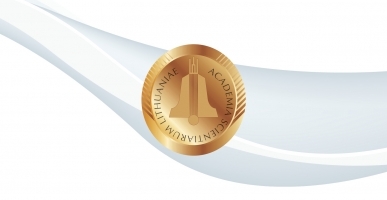Events
General Assembly of the Lithuanian Academy of Sciences: Prizes, Annual Report, and Election of New Members
26 04 2021
A virtual general assembly of the members of the Lithuanian Academy of Sciences was held on 13 April 2021. At the request of Prof. Jūras Banys, President of the Academy, it opened with a moment of silence observed by the participants in honour of recently deceased members of the Academy: Victor Algirdas Snieckus (Canada), Vytautas Petras Rančelis, William Riegel Schmalstieg (USA), and Vytautas Juodkazis.

The assembly extended their best wishes to the colleagues academicians on the occasion of their jubilee birthdays. Commemorative medals of the Lithuanian Academy of Sciences were awarded to the academicians Jonas Mockus (for development of informatics and the theory of global optimisation), Algirdas Gaižutis (for his weighty contribution to Lithuanian aesthetics, art history, and cultural studies), Juozas Vidmantas Vaitkus (for his input to scientific and applied work in semiconductor physics), Henrikas Žilinskas (for notable achievements in the development of veterinary and animal sciences), Rūta Dubakienė (for her contribution to allergy research in Lithuania, popularisation of science, and education of the younger generation), and Kęstutis Sasnauskas (for developing biotechnological sciences in Lithuania and shaping of research policy).
The next item on the agenda was honouring the winners of the competitions for the prizes of the Lithuanian Academy of Sciences. The literary prize of Vincas Krėvė-Mickevičius was awarded to Dr Aušra Martišiūtė-Linartienė for the cycle of five books ‘Vydūno kūrybos tyrimai ir sklaida’ (Studies in Vydūnas’s Work and Its Dissemination); the prize of Jonas Kriščiūnas (agricultural sciences) went to Dr Eugenija Bakšienė for the study ‘The use of lake sapropel for the fertilisation of soils of light granulometric composition’, and Kazimieras Simonavičius prize (mechanics) to a group of researchers of the Kaunas University of Technology: Dr Daiva Zeleniakienė, doctoral student Gediminas Monastyreckis, Dr Sigitas Kilikevičius, and Dr Kristina Žukienė for their research study ‘Study into mechanical behaviour of multifunctional polymer composites with MXene nanoplatelets’.
Prof. Jūras Banys, President of the Lithuanian Academy of Sciences, announced the winners of the competition for the best research works by young researchers and doctoral students 2020. Prof. Zenonas Dabkevičius, Vice-President of the Academy, read the names, titles of works, and research supervisors of the winners of the competition for the best research works by the students in higher education 2020. Prof. Aivaras Kareiva, chair of the Theodor Grotthuss Foundation of the Academy of Sciences, announced Julija Grigorjovaitė, a PhD student in the field of chemistry at Vilnius University, the winner of the 2020 Theodor Grotthuss Scholarship.
After that, Audrys Antanaitis, chair of the State Lithuanian Language Commission (VLKK, Valstybinė lietuvių kalbos komisija), welcomed the fact that for several years, the Lithuanian Academy of Sciences and the VLKK had been electing scholars writing in correct and fluent Lithuanian language. This year, it was Damilė Bagdonavičienė, MA, of the Faculty of Communication of Vilnius University, who received the prize for her study ‘Communication of the identity of a folklore group: a study of the members of the “Ratilio”’.
Next, Prof. Jūras Banys presented to the participants the 2020 Annual Report of the Lithuanian Academy of Sciences, which was unanimously approved.

Jurgita Šiugždinienė, Minister of Education, Science and Sport, spoke to the virtual participants in the assembly about the prospects for the country’s education and science. The aim is to make science competitive and contribute to building a high value-added economy. Research funding is still insufficient. There is a lack of focus on doctoral studies, and the involvement of Lithuanian researchers in Research and Experimental Development programmes is notably insufficient. The country’s research potential is under-exploited. For this reason, the Ministry of Education, Science, and Sport proposes forming and promoting innovation ecosystems in research centres through of business, scientific, and governmental consortia. Missions are another important tool for this project. Funding is to be provided for programmes based on long-term missions and a move towards control of Research and Experimental Development results is to be made.

Prof. Artūras Žukauskas, full member of the Academy of Sciences and the chair of the Seimas Committee for Education and Science, stressed that one of the most important problems currently being addressed was that the state allocations for scientific research were not calculated properly in our country. Unsustainable funding for science and innovation is another issue. This leads to many problems with the continuity of research projects and various programmes. National science programmes are also needed. In the public sector, it is education that creates the largest value and a national science programme ‘Education’ (educational sciences, psychology, etc.) is needed to enhance its quality. We still do not have a system to promote the quality of studies and in this we differ from other European countries. Categories of researchers will also be introduced. The assessment of researchers should be based on their competence and experience and not on the number of research papers.
The chairs of the scientific divisions of the Lithuanian Academy of Sciences introduced the 18 nominated candidates for full membership of the Academy: Albinas Kuncevičius (archaeology), Darius Staliūnas (history), Dainora Pociūtė-Abukevičienė (Lithuanian literature), Dalia Klajumienė (art history), Aušra Maslauskaitė (sociology), Artūras Dubickas (mathematics), Vytautas Getautis (chemistry), Gediminas Račiukaitis (physics), Arūnas Bukantis (climate studies), Aurelija Žvirblienė (biochemistry), Sigitas Podėnas (zoology), Giedrė Samuolienė (agronomy), Elena Bartkienė (food technologies), Kęstutis Armolaitis (forestry sciences), Mindaugas Malakauskas (veterinary), Algis Džiugys (energetics), Marijonas Bogdevičius (mechanics), Saulius Grigalevičius (materials engineering). All candidates were elected full members of the Lithuanian Academy of Sciences. After the approval of the election results, the session was over.
Dr Rolandas Maskoliūnas, chief specialist for public relations of the Lithuanian Academy of Sciences
Translated by Diana Barnard
